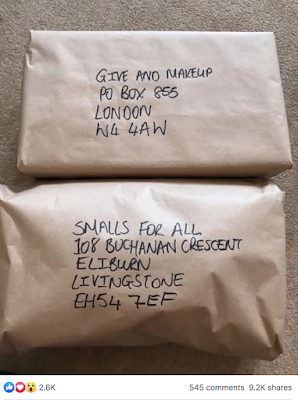Shoes for Souls, good intentions and the bumpy road of DIY aid learning
Dear Kyle,Kyle’s initial response was positive and for about a month we tried to schedule a meeting to discuss Shoes for Souls further (‘Hey Tobias! Sounds great! I am busy before the talk, and after until about 6, could we meeting close to you then?’ read a typical message during this process). After many last minute re-schedules from Kyle and one scheduled meeting where we may have ended up at different Starbucks, our conversation fell silent.
I came across your shoe initiative in the Metro News a few days ago and want to take this opportunity to express my concerns about your project as I believe that it does not fall under good development practice.
As I have mentioned on my blog, there have been disucssions [sic] going on about in-kind donations and the negative impact they have on recipient countries, markets and communities. In addition to the links in my post I am recommending this article as it mentions Zambia and Haiti. The impacts on local industries, especially if large quantities of goods lead to 'shocks' for local producers and markets, the high cost of shipping goods and a general lack of needs assessment are some core problems. Other studies, e.g. on second hand clothing or gifts in child sponsorship relationships also confirm the detrimental impact of such in-kind donations. In addition to all these practical problems there are more far-reaching issues about paternalistic approaches to charity, i.e. 'white people' sending unwanted goods to Africa and the psychological impact on dignity, self-reliance and dependency on foreign assistance. I have absolutely no doubt about your good, charitable intentions, however, as someone who plans to pursue a career in medicine and international development (DalGazette interview) I am expecting more critical inquiries into the complexities of development issues. I would also like to see more evidence of your claims regarding HIV/AIDS infections and the prevention through wearing footwear.
Your initiative may look exciting to the untrained eye and has received support and positive feedback, but from my professional point of view it is still an ill-advised project that feeds into outdated understandings of development processes.
If you have not done so already, I strongly advice you to discuss your project further with development researchers and academics at Dal, social entrepreneurs or aid workers in Zambia and Haiti.
I am based in Halifax and also happy to discuss your project further with you.
Best regards,
About a month later I re-opened the conversation which coincided with another article on Dalhousie University’s website (‘Shoes for souls helps needy feet’). I and other commentators basically repeated the earlier critique:
I strongly agree with Andrea and Tobias. But before I comment further, I'd like to say, good for you, Kyle for wanting to contribute. But that being said, I hope you will look at the links provided and do more research on development and aid issues before you continue sending shoes to any developing country. I have spent time in Africa. I have watched local shoe makers create beautiful sandals and shoes. And I have discussed with locals how the donations that end up in second-hand markets have had a harmful impact on the textile and shoe industries in Africa. I believe that it may be far more beneficial to collect money and help out the local shoe-makers' industry if you would like to contribute in the area of shoes. There are many people who work in the area of development and global health at Dal, with lots of stories and data to share on issues like this. It wouldn't be hard to find people with good advice to advance this project in a sustainable and ethical way.And again, Kyle seemed to be open, even eager, to meet (‘Tomorrow morning work? I want to talk to you?’). But there were a few last minute re-schedules again and in the end I ended up alone at the meeting place we had arranged. After more than two months of futile emailing and two missed meetings I decided that I would no longer pursue any involvement with Shoes For Souls:
Dear Kyle,
You did not show up this morning for our scheduled meeting which is not only unprofessional, but personally offended me. You also left no message to explain the reason for your behaviour. Building and managing relationships is an integral part of any development effort and I do not find no-shows, last-minute cancellations and one-line text-message-style messages a professional way to communicate. I still have serious concerns about the project and its implementation, but you have shown time and again your unwillingness to engage properly with critical voices and, all in all, immaturity. I do not see any basis for communicating further on issues relating to this project.And that was that I thought, not having this blog post or any further response in mind and just let the project go ahead regardless of the criticism. However, I did not anticipate Kyle’s response:
Best regards,
Tobias,As readers of my blog know, I am a firm believer in reflective development practice and learning – which includes improving ideas and projects. I tried to give constructive, yet critical feedback and I felt that the other critical comments were also very reasonable. Taking a step back especially if one is immersed in a project in such a personal way could be very helpful to take fresh views into consideration.
I know you have no intention of listening to my case, because in your own way you have professionally said f you. I'm too busy to try and continue talking with you, I do apologize but you feeling insulted is your own business, its nothing personal. But I can see from your involvement with Kony 2012 and my project, we have differing opinions on the need for international development.
Take care!
I don’t want to make generalisations about DIY aid initiatives, student-led projects or the willingness of young people of ‘doing something’ in international development. However, I can only emphasise to do research and needs assessments before you end up with a warehouse full of second-hand shoes and not turning a development project into a personal mission to prove the world that you can do ‘it’. Professional critique has always been part of development and engaging with this critique has become more and more important with the decades of experience of what works and what doesn’t. Maybe ‘running your own charity’ looks great on your CV, but if long-term sustainable engagement with development issues is your career goal, you need to develop listening and critical thinking skills alongside practical experience.
One of the positive things, all criticism about the documentary aside, that the Kony 2012 process achieved was gathering a fascinating range of critical voices and exposing many (young) development enthusiast to a range of critical readings, resources and debates (see my contribution ‘5 questions for a post-Kony 2012 debate’). That’s as much part of the discussion and impact as the ultimate goal of ‘catching Kony’.
I believe that these learning processes are applicable to most DIY aid efforts, small and large, distant and near.
I recently spoke to a local member of a church about Shoes For Souls and he explained how they conduct careful needs assessments with local charities and shelters before they have shoe- or clothing-drives ‘otherwise we would end up with high-heeled shoes for a men’s shelter or flip-flops in November’. He explained to me how difficult finding suitable in-kind donations really is, how small charities struggle with ‘wrong’ donations or ‘all that rubbish that people sometimes drop off’ – ‘and we do this in our community, so we already have some sense of what is needed where’, he added. He was also very willing to talk to Kyle, too, and sharing his local experience.
To cut a long story short: Shoes For Souls doesn’t seem to look for critical engagement with local or international expertise at the moment and I dread the day when the containers of second-hand shoes will flood markets and communities in Zambia where the potentially negative impact will be real and profound.
* There are also other charities with similar names and objectives like Soles4Souls and Shoes For Orphan Souls




"...if long-term sustainable engagement with development issues is your career goal, you need to develop listening and critical thinking skills alongside practical experience." Amen and amen. Good for you trying to engage with openness and perseverance. Reminded me of this story: http://www.how-matters.org/2011/05/03/barefoot-in-church/
ReplyDelete